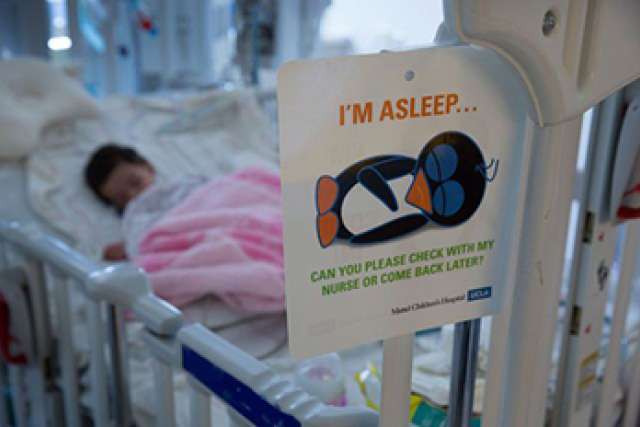Signs, sleep sensors and commonsense strategies are helping young patients rest during the night under a hospital initiative.
Intensive care units are full of high-tech equipment and highly trained professionals, but UCLA Mattel Children's Hospital is focusing on a simple aspect of patient care that's often overlooked: sleep.
Through an initiative called Supporting Sleep for Health and Healing (SSHH), staff members in the pediatric intensive care unit (PICU) have been able to increase the average night's sleep for their patients from 6 hours a night to 7.5 hours. That means, over the course of a week, patients get more than an entire night of extra sleep.
Many of the initiative’s strategies are just common sense: Overhead lights are turned off by 10 p.m.; doors are fitted with silencers to prevent them from banging when they close; and medical carts’ wheels are lubed to eliminate squeaking.
A stoplight noise monitor warns the staff at UCLA Mattel Children's Hospital when there's too much noise being generated.
But staff members also came up with some novel ideas, such as installing noise sensors in each room to alert them when things get too noisy. They also placed white noise machines by every bedside and changed their care routines to combine as many nighttime procedures as possible, so patients are disturbed as infrequently as possible.
Theresa Kirkpatrick, a clinical nurse specialist in the pediatric intensive care unit at UCLA who helped develop the sleep initiative, told USA Today that since the program began late last year, patients need less medicine at night, babies’ sleep schedules are more consistent and regular, and the alarms that do go off are more likely to be meaningful rather than a nuisance.
Parents have a role in the better-sleep initiative too. Here are some tips for parents to help children sleep better during their hospital stay:
- Try to keep your child on a similar sleep schedule as the one at home, with time for extra naps and longer sleep periods at night.
- Make the hospital room as dark as possible at night and as light as possible during times when your child is awake. This will keep your child aware of day and night changes and encourage natural sleep.
- Use items from home to provide comfort to your child, particularly during sleep — a favorite blanket or stuffed animal, for example, or a pillow from home.
- Play soft music or white noise to drown out some of usual hospital noises that will disrupt sleep.
- Try to time a warm bath for just before bedtime.
- Try motion. Rocking or swinging can help infants fall asleep better. So can swaddling.
- Create story time. Hearing a parent’s voice can soothe kids and help them get to sleep. If parents can’t be there in person, they can tape a favorite bedtime story. For older kids, audio books can be a good alternative.
- Speak up. Parents should not hesitate to ask nurses to be quiet when entering the room.
In addition to Kirkpatrick, Dr. Yonca Bulut, professor of pediatric critical care; Dr. Myke Federman, associate clinical professor of pediatric critical care; and Jennifer Armstrong, a nurse in the pediatric intensive care unit; were part of the multidisciplinary team that designed and implemented the sleep initiative.



